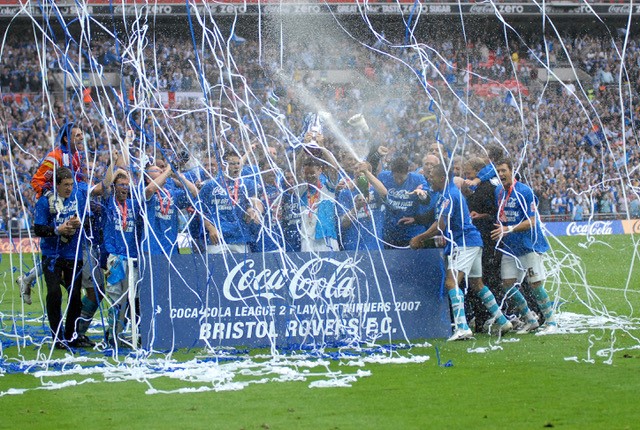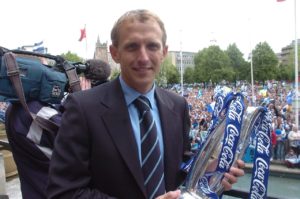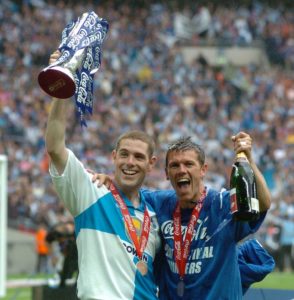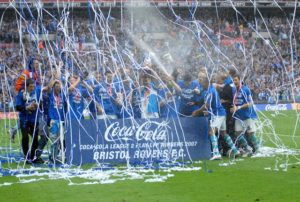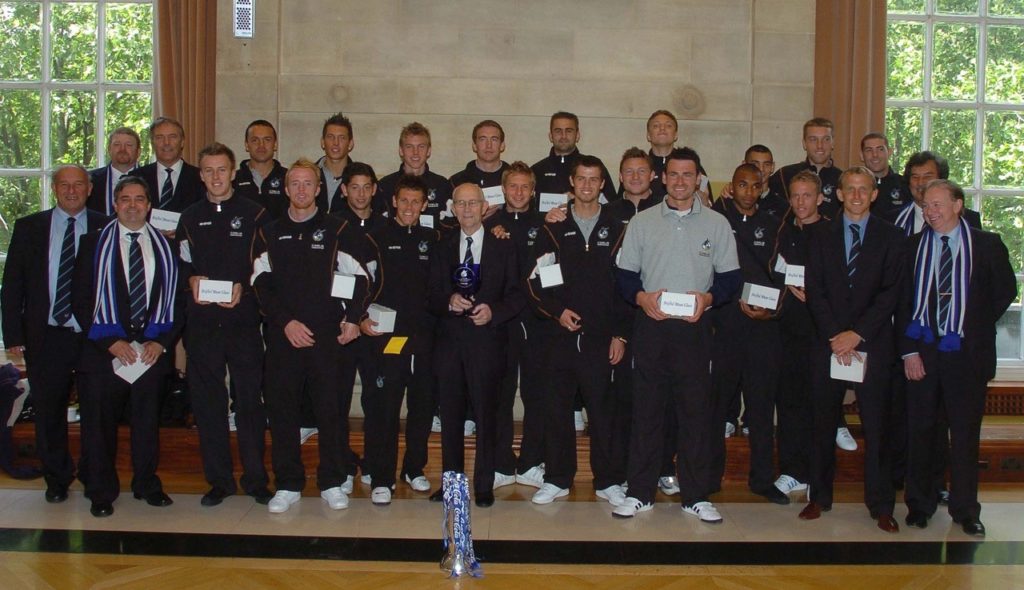Gerry Francis remained in charge for 1990/91 but was then succeeded by Martin Dobson, Denis Rofe, Malcolm Allison, Ian Holloway, Francis again, Garry Thompson, Ray Graydon, and Ian Atkins while there were caretaker stints from Steve Cross, Phil Bater and Russell Osman and Kevan Broadhurst thrown in for good measure.
None of the above, though, managed a promotion and Rovers remained in the league’s basement division. That was until the arrival of Paul Trollope. Signed as a player by Atkins, he took over from him as caretaker boss and after nine games stepped up to become First Team Coach under a newly appointed Director of Football, Lennie Lawrence.
The two gradually built a side good enough to gain promotion in 2006/07, though they did it the hard way, through the play offs. A season that began with 4-1 defeat against Peterborough at London Road, ended in a Wembley Final against Shrewsbury Town and a 3-1 win that guaranteed promotion.
By that time Rovers had already played the final of the Johnstone’s Paint Trophy, losing to Doncaster Rovers in the last English domestic final played at the Millennium Stadium.
(photo courtesy of Jeff Davis)
Trollope had only seen his side cement a place in the play offs with a dramatic 2-1 win at already promoted Hartlepool United on the final day of the season, and then saw them beat Lincoln City in the first leg of the play off semi final at the Memorial Stadium. The score on that occasion was 2-1 but his side really turned it on in the second leg with an amazing display of attacking football that saw them win 5-3 at Sincil Bank, giving them a 7-4 aggregate win.
And so it was off to Wembley on May 26th 2007 to face Shrewsbury Town, a side they had taken four points from during the regular season.
They made the worst possible start, conceding in the 4th minute when Stuart Drummond glanced a header past Steve Phillips following Neil Ashton’s free kick. Rovers drew level on 21 minutes when Richard Walker got on the end of Ryan Green’s cross and beat Chris Mackenzie with a left foot shot.
The Rovers striker then scored a fantastic goal, after 35 minutes, to give Rovers the lead. Running into space on the left, he received the ball from Chris Carruthers and as goalkeeper Mackenzie advanced off his line he chipped the ball over his head and into the far corner of the net.
The second half saw Shrewsbury try desperately to get back on level terms. They were reduced to ten men with one minute left on the clock. Marc Tierney collected his second yellow card of the afternoon for a foul on Stuart Campbell, but there was still drama to come.
Mackenzie went up for a late Shrewsbury corner, but the ball was cleared as far as Sammy Igoe, deep in his own half. The diminutive midfielder set off for goal with several Shrewsbury players in hot pursuit. As they closed on him, Igoe summoned up enough strength to shoot, but as the ball rolled agonisingly towards the empty net it seemed as though Kelvin Langmead would get back to clear.
Time seemed to stand still, and everyone watched and waited, until a resounding roar went up from the estimated 40,000 Gasheads in the official attendance of 61,589, which told everyone that the ball had crossed the line and Bristol Rovers were promoted.
In the regular season Rovers finished in 6th place, winning 20 of their 46 league games, drawing 12 and losing 14, scoring 49 goals and conceding 42. A total of 24 players were used in league fixtures and whilst no one claimed an ever present record, Steve Phillips missed just two games, and Craig Disley four.
Eleven players made their Rovers league debut, namely; Ryan Green, Steve Phillips, Andy Sandell, Byron Anthony, Sean Rigg, Rickie Lambert, James Walker, Jamal Easter, Stuart Nicholson, Sam Oji and Joe Jacobson.
The only seven relevant to Rovers and this season appears to be 7-4 aggregate win against Lincoln City in the play off semi final!
Final words on the Wembley triumph from Paul Trollope; ‘I’m happy at Bristol Rovers. There’s a new stadium around the corner, and I want to be here for the foreseeable future because I owe the club a great deal. It made me a proud man to take charge of the club and I want it to continue.’
(photo courtesy of Jeff Davis; Wembley photos courtesy of Neil Brookman)
Keith Brookman

